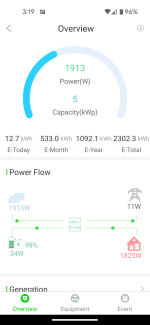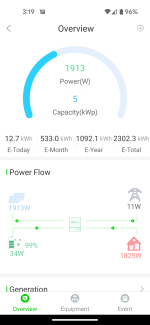You are using an out of date browser. It may not display this or other websites correctly.
You should upgrade or use an alternative browser.
You should upgrade or use an alternative browser.
Solar Interest and Selling Power Back
- Thread starter workinonit
- Start date
- Views: 7841
More options
Who Replied?
/ Solar Interest and Selling Power Back
#71
Pearlsnaps
Member
I thought I replied to this already, but it seems to have disappeared.Family of seven......only using 400kwh....
Must be all gas? Gas water heater, gas stove, gas dryer?
I use more than that, but I only average about 400 kW per month that I have to buy from the grid. I do have a gas tankless water heater and stove that have been converted to propane. I have an electric dryer but only use that during the day when it's not warm enough outside to dry the clothes. I just put in a dishwasher about 4 months ago and was previously washing by hand. And again we only use the dishwasher and the microwave during the day if at all possible.
I put a screenshot below of my inverter for today. It's about 90° outside I run too many split air conditioners right now and the house is about 73°. It's an $1,100 ft² 1 and 1/2 story home.
Solar is fully providing for all of the energy usage of the home and has already charged my batteries for the day.
Attachments
Fuddyduddy1952
Super Member
- Joined
- Aug 10, 2022
- Messages
- 8,996
- Tractor
- john deere
A friend lives in Palm Springs California where they get (my guess) 362+ days/year sunshine. No brainer I'd have solar there.
What's odd is we discussed basements which they don't have (?!!!). Doesn't make sense, underground is cool (maybe they'd have to go really deep...?).
They use swampers for cooling...lots of 120°F days.
What's odd is we discussed basements which they don't have (?!!!). Doesn't make sense, underground is cool (maybe they'd have to go really deep...?).
They use swampers for cooling...lots of 120°F days.
Carl_NH
Elite Member
- Joined
- Apr 5, 2002
- Messages
- 3,966
- Location
- Coastal NH
- Tractor
- 01 Kubota B21TLB, 2010 Ferris 52" ZTR, Cub Cadet 1811, Gravely Super8
We put in 7.2 KW solar in 2014 in NH, 24 300W LG panels, Solar edge inverters - generates 7200-7500KWH/year which is 80% of our consumption, and we have grid tied net metering so 1-1 return as rates change.
My findings/opinion is: if your rates are under $.12 KWH the solar ROI is not there, unless you build and install yourself.
- Total installed cost $26,000- less 30% tax credit $8K, less $5K NH credit - net cost $13,000.
- If I bought and installed the system would have cost about $18,000 out of pocket, tax credit of $4500 and state rebate of $5K net cost to me would have been $9K (vs $13K) and no warranty service or support for 5 years no cost.
- The $4K delta to have a 5 year Parts and Labor warranty, PLUS not installing and getting the permits was worth every penny.
- Electric Rates in NH: 2014 $.18/KWH, 2020 $.21 KWH, 2022 $.26/KWH
- ROI at original rate of .18/KWH - 9 years, with rate increases less than 8 years.
My findings/opinion is: if your rates are under $.12 KWH the solar ROI is not there, unless you build and install yourself.
dmccarty
Super Star Member
When I designed our house, I oriented the house and a roof slope to try to maximize solar power production. Not quite perfect but pretty danged close. We still don't have any solar panels because we do not have the 20-30K dollars to do the installation. I will try to make some other comments but Beeenvenue's number 4 is spot on....
4) MOST IMPORTANT!!! States and other govt entities are CHANGING laws and procedures constantly with respect to this. No matter what you think is a good deal today, a new law tomorrow can change or invalidate the whole economies of your installation.
The rules, rebates and payouts are constantly influx. NC used to allow one to write off 30-35% of the cost of the installation. Now, the power company has a lottery to pay off some of the PV costs but there are only a limited number of installations that will be paid for each year. When they open the website for the applications, you have to be online at midnight waiting to hit the sent button at 24:00:01.
Either last year or early this year, the environmentalists, state government, green energy companies and the power company created a 50 page bill that was eventually reduced to 10 pages regarding new power regulation, including, PV. I tried to read it, but it was not readily understandable, which was done to hide what was truly in the law. They are rewriting the bill already..... I would not bet that the new bill will be to my benefit....
I attended a class on PV installations a few years ago. One of the lessons learned was to figure out how much energy usage you consume and then size the solar installation so that it supplies most of your power but not all. Do not even think about trying to sell power back to the power company, because one, you lost money on the transaction due to the difference between retail and whole sale pricing, and two, because dealing with the power company was not worth the hassle.
The rule of thumb is that one will loose about 25-33% of the power generated at the panel by the time it hits an outlet. That drives up your installation cost. Adding batteries to the installation drives up the cost quite a bit. Lithium batteries are an improvement over lead acid but there are be dragons with lithium...
As has been said, what is true regarding PV power installations and tax implications depends on your local, state and federal realities. What is true today, may not be true tomorrow, and certainly has not been in the past. I have seen this since we have built our house. So when looking at ROI, make danged sure any incentive out there is actually something you can receive and receive in a timely manner.
Years ago, Spain had incentive programs for people to install PV and many people did. Not only putting up PV for their house, but also building large arrays to supply the grid. The government needed money, so the incentives ended, and the government decided to TAX the PV installations. Many people had to removed the solar panels due to the tax, and some people who had built larger arrays, are loosing their investments and going bankrupt.
Later,
Dan
cqaigy2
Super Member
Not a PV install, but my sister and BIL "bought" a few panels as an investment, thru the local power company for $500 per panel, a few years ago, and saw $2K check their last payment, prior was a few hundred dollars.


